'Some people thought I was mad to get a licence - but I got on with it'
Alan Sweetman meets the most successful female trainer in Irish racing history
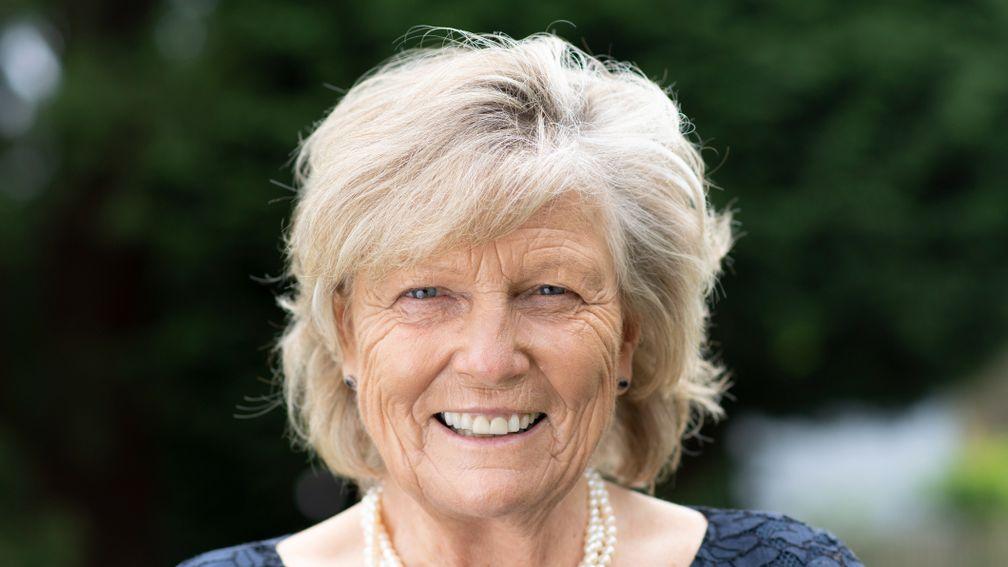
This was originally published to Members' Club Ultimate subscribers on Tuesday, June 22, 2021 as part of our Racing Pioneers series. It has been made free to read to celebrate International Women's Day. For more great interviews like this, head to our subscription page here, select 'Get Ultimate Monthly' and enter code CHELT22 to get your first month for just £9.99!
On August 31, 1966, Anne Bullitt Biddle, a stylish American heiress based at Palmerstown Stud in County Kildare, made Irish racing history when sending out Flying Tiger to win the Cork Stakes at Naas.
Biddle was the first of her gender officially to train a winner in Ireland after the Turf Club lifted a discriminatory ban, previously circumvented by a number of determined women using the subterfuge of having a male name on the licence.
Mrs Biddle's name is the first to spring to Jessica Harrington's mind when she is asked about the role played by women on the training scene in Ireland, apparently grateful to deflect attention from a question about her own pioneering status as the most successful female trainer in Irish racing history.
She says: "Mrs Biddle was a very well-known personality in Irish racing when I was growing up, and there were many other women involved with training horses one way or another in the 1950s and 60s. I remember hearing about Toby Wellesley, who trained big-race winners with the licence held by her head man, and I knew Mrs Nolan, who got her licence along with Mrs Biddle when the Turf Club allowed women to train. They were pioneers, I would say."
Harrington is referring to Wellesley and the formidable Peggy St John Nolan, whose 1959 Irish Grand National triumph with Zonda was officially credited to Matt Geraghty. Wellesley's big-race winners after her separation from her husband Ginger Wellesley appear in the record-books under the names of Eddie McGrath and Patrick Connolly.
Yet there is no question that Harrington was the woman who truly broke through the glass ceiling for female trainers in Ireland. She has won the Gold Cup, the Champion Chase, the Champion Hurdle and the Irish Grand National over jumps, Classics and Group 1s on the Flat, and is now the most powerful dual-purpose trainer in the game. Such achievements would have been unthinkable when she set out in an inherently male-dominated environment in 1989 – even more so when her journey into the world of racing began 23 years earlier, around the time of Biddle's breakthrough.
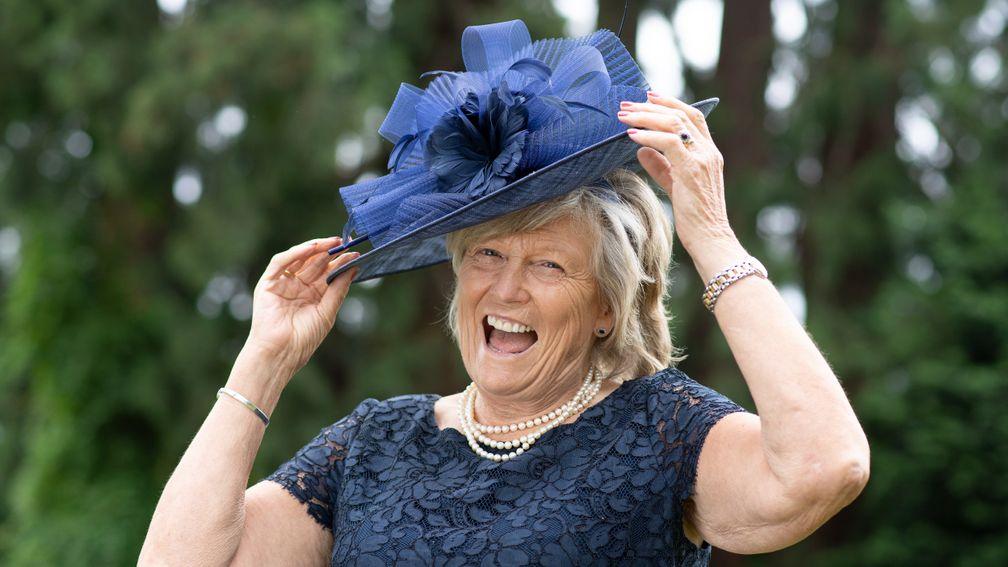
"I was 19 and was all set to compete at the Badminton Horse Trials for the first time," Harrington says. "I was due to ride Gold Buck, who was a homebred thoroughbred. Then Badminton was cancelled because of bad weather. That was a blow, but one good thing came out of it.
"I had really wanted to ride point-to-points. My father wasn't too keen on the idea, but Gold Buck was fit and I got the go-ahead to ride him at a meeting in Wexford. We finished third. That was my only point-to-point ride in Ireland. I lost the ride to my brother John, who rode him to win the next time."
Sporting background
Harrington and her brother John Fowler grew up at Rahinstown House in County Meath, the family estate inherited in the 1950s by their father Brigadier Bryan Fowler, a silver medallist on the British polo team at the 1936 Olympic Games. Their mother Mary was the daughter of another leading polo player, Cecil Nickalls.
Under their parents' tutelage, the siblings were seldom out of the saddle. Harrington showed precocious talent, winning the Under-17s title at the Pony Club games in Britain as a 14-year-old.
In 1967 she was compensated for the previous year's disappointment when competing at Badminton for the first time. The same year she joined her brother on Ireland's three-day event team at the European Championships.
A gifted all-round horseman, Fowler became one of Ireland's outstanding amateur riders and later a successful trainer before his cruelly premature death in a farm accident in 2008.
Harrington's eventing career took in many international appearances. She rode in the Olympic substitute competition at Fontainebleau in 1980, at the World Championships in 1982, and was on the Irish squad for the Los Angeles Olympics in 1984 only for her mount to pick up an injury. A third placing on the homebred Amoy at Badminton in 1983 was a cherished highlight.
Her experience as a top-class rider in a demanding discipline provided far more than hands-on experience when she turned her attention to training racehorses in her 40s. Harrington believes it shaped her attitude.
"In eventing we were all the same, we competed on equal terms. I was on Irish teams with men and women, and nobody ever gave it a second thought. We were all riders. The only difference was that some of the smaller girls had to carry a huge amount of lead to make it up to the 11st 11lb mark which was the same for men and women.
"Equality was something I was used to, all the way back to childhood competition. I probably brought that thinking with me when I started training. It may have been a confidence thing too. I've always tended to trust my instincts with horses, and thankfully things have usually worked out."
In three-day eventing Harrington competed during an era when British riders Mary Gordon-Watson, Lucinda Prior-Palmer (Green) and Ginny Holgate (Leng) achieved world champion status.
Closer to home, her awareness of boundaries being broken down in Irish racing was furthered by her knowledge of her brother's colleagues in the amateur riding ranks.
"Helen Bryce Smith had a wonderful record in point-to-points," she recalls. "My brother would always say how competitive she was, and Willie Rooney's daughters, Rosemary Stewart and Ann Ferris more than held their own against the men. Ann won a Sweeps Hurdle and an Irish Grand National. Sarah Collen rode a Galway Plate winner. And of course, there was Joanna Morgan on the Flat, the first woman to ride at Royal Ascot."
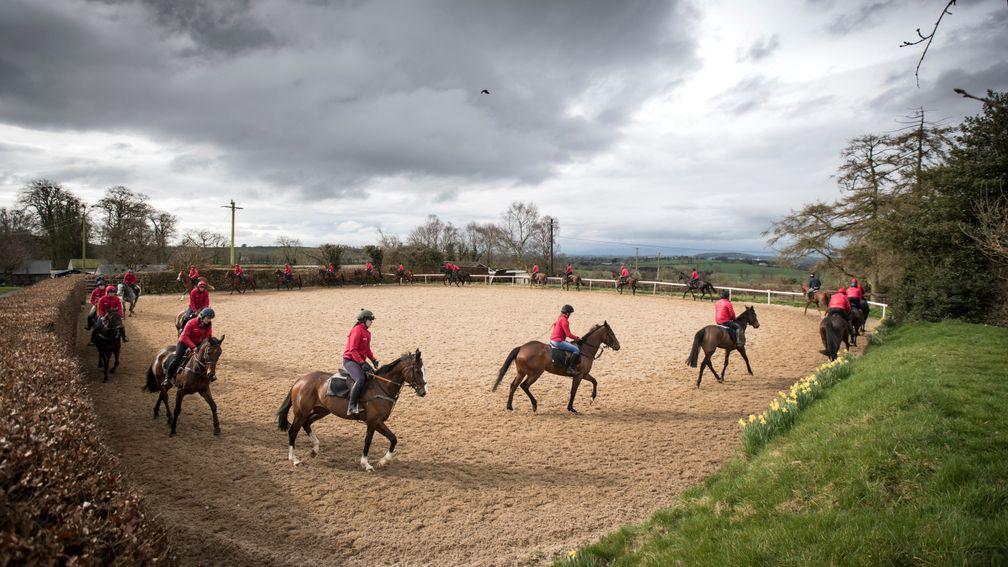
New beginnings
Following divorce from husband David Lloyd, with whom she had two children, James and Tara, Harrington remarried in 1976. Her new husband, bloodstock agent Johnny Harrington, held a permit to train.
"Johnny always kept a few horses about the place with Eamonn Leigh as his right hand man. They had a proper mentor too," she says, revealing how the pair would consult the legendary Paddy Sleator, one of Ireland's greatest trainers, based at Grangecon in County Wicklow, five miles down the road from Harrington's stables at Moone in County Kildare.
"Johnny was travelling a lot in those days and he thought it would make more sense if I held the licence. I took it over in 1989."
Two more daughters, Emma and Kate, were on the scene by this stage.
"Some people thought I was mad, Kate was three months old when I got my licence. But I did what I've always done, I got on with it."
Harrington started out as a trainer at a time when the fortunes of Irish jump racing were at a low ebb. That, she suggests, was a more pressing concern than the fact that she was a woman operating in an overwhelmingly male-dominated profession.
"I remember one year coming back on the plane from Cheltenham with John Mulhern, who had trained the only Irish winner at the meeting, Galmoy. The year I took out the licence there was none. I knew only too well that it wasn't a great time for Irish jump racing because my husband was busy buying horses for English trainers. It was very hard to keep a good young jumping prospect in the country at the time."
Harrington recalls how Johnny bought horses for a range of top British trainers, including Jenny Pitman, who had made an historic breakthrough for women across the Irish Sea with Corbiere in the Grand National in 1983 and Burrough Hill Lad in the Cheltenham Gold Cup in 1984.
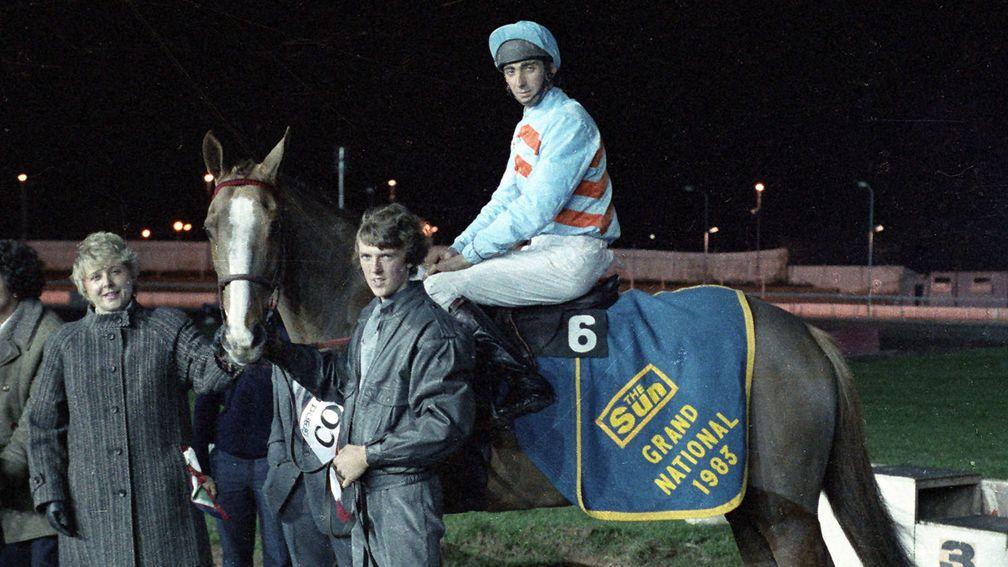
Harrington is adamant that her gender was never a deterrent, though she has often recounted how one or two owners in the early days would ask to speak to Johnny because they assumed he was the real trainer.
"That amused me certainly because Johnny would hardly have been able to pick out one horse from another in the yard once the numbers started increasing. And he wouldn't have had a clue about how they were going or what the plans were. So we used to laugh about it. It didn't bother me in the slightest."
Landmark victories
Steeped as she is in racing, Harrington is not blind to the significance of what her best horses have achieved but, while she relishes winning major races, she is reluctant to cast herself in the role of groundbreaking female trainer.
"If other people want to highlight that aspect it's fine, but it's not something I've ever thought about. I'm not like that. I've always tried to train as many winners as I can and always keep moving on.
"Of course there are landmarks, and you work towards them. Oh So Grumpy was an important winner in the Galway Hurdle. That was 1994, so we had been going only five years, and it helped to raise the profile. But the part about being the first woman to train a Galway Hurdle winner wasn't a thing for me at all."
Harrington's initial progress was solid if unspectacular. Her first ten seasons produced a total of 80 jumps winners. She sent out only 14 winners on the Flat during the 1990s. Her progress gathered pace with 52 jumps winners in the last two seasons of the decade.
She identifies 1999 as a breakthrough year thanks to Space Trucker, who gave her a first Cheltenham Festival winner in the Grand Annual, and Moscow Flyer, who recorded his first Grade 1 victory in the Royal Bond Novice Hurdle.
"Moscow's record speaks for itself, but Space Trucker was a really special horse too. We bred him ourselves, I had him from scratch. He won bumpers and on the Flat. He was my first winner at Cheltenham in the Murphys [Handicap Hurdle] and my first Graded winner in England in the Fighting Fifth. He won 15 races and finished third in a Champion Hurdle. He really put us on the map."
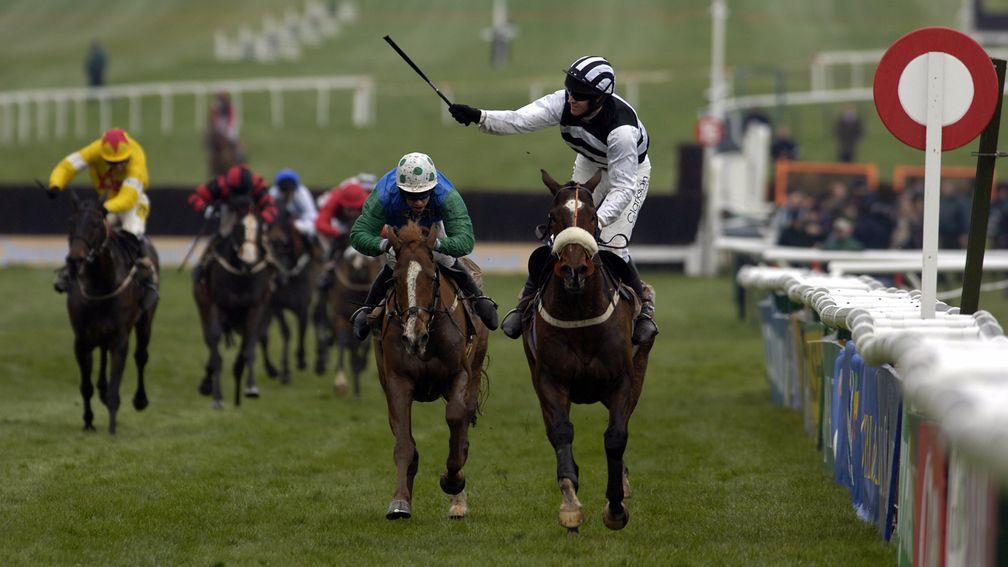
She is proud of how Moscow Flyer regained the two-mile championship crown when winning the Champion Chase as an 11-year-old in 2005 and delights in Sizing John's record as the first horse to win the Irish Gold Cup, the Cheltenham Gold Cup and the Punchestown Gold Cup in the same season.
"It's wonderful when the big ones work out, and they are milestones of course. Same on the Flat. It was a really big day for me when Pathfork won the National Stakes in 2012. It proved I could train a Group 1 horse on the Flat. And then I had Alpha Centauri, which showed I could train a Classic and a Royal Ascot winner."
Commonstown has always been a family operation. Husband Johnny, charming, amusing and gregarious, was a source of inestimable support. Harrington's habitual resilience was tested when he died in 2014 after a lengthy battle with cancer.
Daughters Emma and Kate form a triumvirate in the business with their mother, with Emma's husband Richie Galway providing a touch of gender balance.
Striving for success
In keeping with her no-nonsense attitude, Harrington is reluctant to portray her career in terms of a struggle, other than in the general sense of the ferocious competitiveness of Irish racing.
She says: "People outside Ireland often say to me, 'How can you compete with Aidan and Willie?' I say by working harder and trying to get better all the time."
She chooses her words carefully when addressing the subject of role-model status.
"I've spoken to Rachael Blackmore about this and I think it's a tricky subject in a way. Of course it's brilliant if Rachael inspires young people, young girls especially, but first and foremost she's a top-class jockey, a professional with a job to do. I think she and I have a similar attitude. Neither of us think that the fact of being a woman should be the main focus."
She would like to see more women in the training ranks but is not overly dismayed by statistics which show only 29 women among the 339 Irish trainers fully licensed by the IHRB and 31 out of 197 restricted trainers.
"Not much more than ten per cent in all, that's not great is it? But I look at it this way. The men have been at it for centuries, we've had only 50-something years. There's a lot of ground to make up, but we'll get there."
Five and a half decades on from Mrs Biddle's history-making win, Jessica Harrington is doing more than anyone to make up that ground.
Read these next:
'Vauban? He's better than Pied Piper' – Patrick Mullins answers your questions
Can Britain fight back? Our experts provide their 1-2-3 for the Gold Cup

Join Racing Post Members' Club for just £9.99 for your first month!Members' Club is the only subscription racing fans and punters need in order to stay informed and make smarter betting decisions. Features include early access to the Racing Post digital newspaper, exclusive news and interviews, premium tips and form study tools to assist with betting. Head to our subscription page here, select 'Get Ultimate Monthly' and enter code CHELT22!
Published on inInterviews
Last updated
- 'You can see why people end up struggling - when you're trying to pay the electric bill, losing one ride can be massive'
- 'I've never paid six figures for a horse and never will - I learned pretty quickly you're only one phone call away from f*** all'
- 'I’ve trained some fabulous horses, worked with some excellent riders - maybe I have brought a little bit of talent to the table as well'
- ‘When you’re in the moment and you’re starved, you’re ready to explode - everything built up and I just lost my s**t’
- 'He must have his breakfast earlier than Willie does' - Patrick Mullins goes behind enemy lines at Gordon Elliott's yard
- 'You can see why people end up struggling - when you're trying to pay the electric bill, losing one ride can be massive'
- 'I've never paid six figures for a horse and never will - I learned pretty quickly you're only one phone call away from f*** all'
- 'I’ve trained some fabulous horses, worked with some excellent riders - maybe I have brought a little bit of talent to the table as well'
- ‘When you’re in the moment and you’re starved, you’re ready to explode - everything built up and I just lost my s**t’
- 'He must have his breakfast earlier than Willie does' - Patrick Mullins goes behind enemy lines at Gordon Elliott's yard